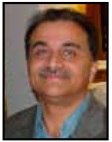Ramadan at the Muslim Community of Folsom, California
By Ras H. Siddiqui

Folsom, California is home to a small but vibrant Muslim community which primarily consists of residents of eastern Sacramento County and western El Dorado County. Their place of worship is the Muslim Community of Folsom (MCF) facility located at 391 S Lexington Dr #120 in Folsom, adjacent to The Block and Lakeside Church near the intersection of Oak Avenue Parkway and East Bidwell Street.
MCF started off in 2011 as just a Mosque, catering to the spiritual needs of a growing community. Today it is doing much more as it has expanded its services to include a Sunday School, conducting marriages, offering counseling services, cub scouts, youth, women and senior programs, and assistance with funerals, to name a few. It has now become a real community center and is quite a popular place for immigrants and their families from diverse backgrounds, especially people from the Middle East and South Asia (Bangladesh, India, Pakistan and lately Afghanistan), who are drawn to Folsom, a technology hub with good public schools.
The MCF congregation has grown under the capable leadership of Imam (now Mufti) Aamir Nazir who is himself from South Africa, but with family roots in South Asia. Mufti Aamir is a religious scholar, a great Cricket player and fan, one who strongly supports the South African national team. And besides Arabic and English, he surprisingly has a better command of the Urdu language and its poetry than many immigrants who are from where the language is spoken. He is also a very personable individual who makes himself available to people interested in issues of faith. Under his leadership, MCF also holds an annual event called a Seerah Conference, focused on the life of Prophet Muhammad (peace be upon him), which is widely attended.
Ramadan is a very busy time of year for Muslim places of worship and MCF is no exception. The Muslim sabbath is on Friday and it was on the first Friday of this holy month that we had a chance to visit this congregation in the evening. Upon entry, people could be seen with their bowl of appetizers of a single date, small slice of watermelon, and a samosa, along with a glass of water or a flavored milk waiting for the prayer call so they could break their fast. This breaking of the fast is called Iftar. When you have not had anything to eat or drink the whole day, you certainly understand the importance of the food in front of you.
Once the call was heard for sunset (Maghrib) prayers at around 7:20 pm, the consumption of these treats started immediately, since one is supposed to eat quickly, wash up and enter the Mosque for prayers. As is the custom, men and women offered their prayers separately, and remained segregated inside the facility. There were several kids here too, enjoying Ramadan and a chance to meet their friends.
We had listened to Imam Aamir Nazir’s Khutbah (Sermon) earlier in the day during the Jumah prayers online as they are telecast live on YouTube. This time, his sermon was basically a detailed revision of Ramadan do’s and don’ts, which need to be revisited as Muslims have 11 months in between to forget the rules. Since the sermon had already been presented earlier in the day there was no need for another one during the sunset prayers which were performed rather quickly.
Dinner was served after the prayers which is customary. MCF arranges for a Community Iftar on Fridays and Saturdays during Ramadan which includes the initial appetizers and a boxed dinner. These are sponsored by a handful of families who pitch in the funds to help feed everybody present. Menus vary each time, as the foods of different national origins are available.
This time around, the boxed dinner contained Afghan bread, spicy rice (Indian-Pakistani Biryani), and chicken along with a side of salad and chickpeas. And why is it important to mention? The answer is that all over the world, each culture has created its own special way of serving the Ramadan Iftar meal, and when you have not eaten since 6 am, food and drink become exceedingly important 13 or so hours later.
The month of Ramadan focuses on an enhanced spiritual relationship with God. Depriving oneself of food and drink also creates an appreciation of what we may otherwise take for granted. The MCF in Folsom exhibits a great deal of cultural fusion. If any of the readers here are interested in knowing more about this community, it does have an “Open Mosque Day” and a generous outreach policy. They are good neighbors and add a nice touch to Folsom’s diversity.

